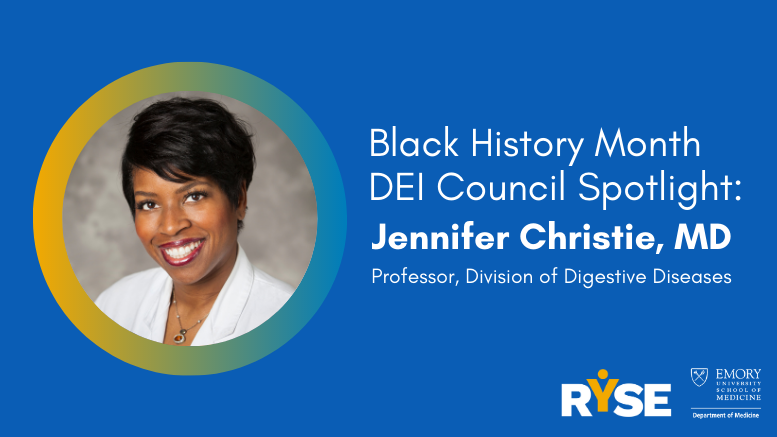The Department of Medicine is celebrating Black History Month by highlighting the incredible work of the faculty and staff members on our Diversity, Equity, and Inclusion (DEI) Council.
Read an interview below featuring Jennifer Christie, MD, professor in the Division of Digestive Diseases. Christie shares her experience working on DEI initiatives and serving on the frontline of two pandemics, COVID-19 and social unrest.
Why did you decide to pursue a career in medicine?
I know this sounds cliché yet from the time I was a little girl, I have wanted to care for others. I knew I would be a physician, however, I thought I would become a pediatrician. I love kids!
What led you to take an active role in diversity initiatives within medicine?
There have always been large gaps in access to educational, research, and mentorship opportunities for people of color. I have been able to take advantage of the opportunities that have been afforded to me and I feel very grateful to be able to help create strategies and initiatives to increase access and opportunities for others that may look like me. Without a doubt, all institutions and organizations are better with greater diversity. I am moved to help in any way I can to make us better.
What does equity look like to you?
That’s a difficult question because there are so many ways in which we need to tackle equity in our society. However, true equity to me manifests as representation and influence of all people regardless of race, ethnicity, gender, sexual orientation, religion, or disability at all levels of an organization, particularly the C-Suite.
How has mentorship impacted your personal and professional development? What is the best piece of advice you have received from a mentor?
I did not recognize the extraordinary value of mentorship until my last year of GI fellowship. However, I was fortunate to meet my most influential mentor, Dr. Suzanne Rose, as a third-year gastroenterology fellow. She has guided the trajectory of my career. She has served as a confidant, supporter, coach, advocate, and is my dear friend. The best piece of advice from Dr. Rose is that you should ask for what you want.
If you were given access to all the resources you need to meet a specific social need for any population, what would that project/initiative be and why?
Assuming I had access to all of the required resources, I would open groceries stores in low-income communities and stock them with healthy, fun, and affordable food choices. Access to healthy food is difficult in low-income neighborhoods which negatively impacts obesity rates, diabetes, cardiovascular disease, cancer, mental health, and death.
After serving on the frontline of two pandemics (COVID-19 and social unrest), how have your priorities and/or values changed? What are your biggest takeaways from the last year?
The pandemic has been very difficult for everyone on so many levels. I have learned that the best solutions to a problem are created as a team. As a leader, I have tried to exude patience, optimism, focus, fairness, and a commitment to team values. Indeed, we have an amazing team at Emory, particularly within the Division of Digestive Diseases.
Most importantly, I have had many more difficult conversations on issues related to systemic racism and its impact on disparities in medical leadership and health care in the US. While sometimes uncomfortable and unpopular, speaking up for what I believe is fair and just has helped me to sleep better at night, and has led to additional opportunities to influence a larger audience.
What figure in Black History has been your biggest inspiration and why?
There are so many figures that have inspired me this year such as VP Kamala Harris, Michelle Obama, John Lewis, and Stacy Abrams. However, Dr. Sadie Curry, the first African American female gastroenterology (GI) has very recently resurfaced as someone who has influenced me a great deal. She does not know this, yet she inspired me to pursue a career in gastroenterology when I was a second-year medical student at the Howard University College of Medicine in 1996. At the time, I had no idea that she was the first African American female GI — after all, it was 1996. However, I learned very recently that she was not only the first African American female — she also served as a servant leader in Black medical societies and in her community. It doesn’t hurt that she is quite stylish as well! I pray that I can inspire others to find a career that they truly love and improve lives in the process.
Related Links


Be the first to comment on "Black History Month DEI Council Spotlight: Jennifer Christie, MD"